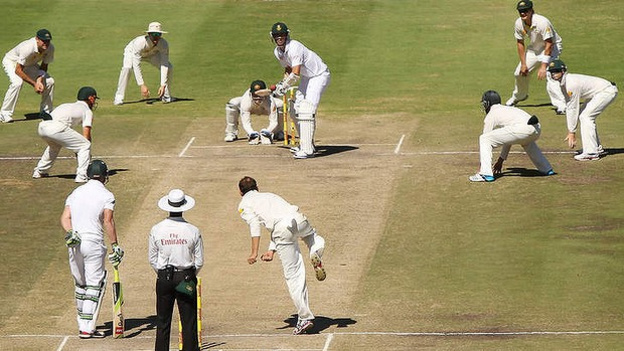
If I were the South African cricketer Francois (Faf) du Plessis, as Mitchell Johnson accuses me of saying things behind his back, I would have just grinned and said, "Mitch, I was paying you boys a compliment." A clash of words that occured during the 3rd Test in Cape Town between opposing players. Du Plessis had likened the on-field behaviour of the Australian team to a 'pack of dogs'. Quite an observation! The style of Australian cricket has always been one of sustained aggressiveness.
If you place the current (2013) South African team, statistics and reputations, alongside the Australians, on paper at least, there is a gulf in talent and experience in favour of the South Africans. Not only that, the sporting culture in South Africa operates through a different sociology from that in Australia. The South African team is multi-ethnic; a rainbow nation generation, well bred chaps quietly going about their business with decorum. The Australians are rather more rough and ready. They howled like a pack of dogs when du Plessis was dismissed by the part-time spinner Steve Smith. Hardly decorous but humourous. As Francois himself will have to admit, it was a rather obvious reaction. It was one of those 'only-in-cricket' moments.
Because the result does depend on the quantity of unplayable balls a bowler can deliver, cricket can give the impression that it relies a lot on skill but essentially it is luck; the two brilliant yorkers by Ryan Harris that won the match being cases in point. Bowlers are often hesistant to use the yorker because the length has to be perfect otherwise it will be hit for a six. With four overs to go in the match Harris, who had been toiling all day bowling more or less the same length and line, was suddenly gripped by an overwhelming desire for victory and tried two deliveries he had not used for the entire summer.
What created this forceful motive can only be understood in the peculiarities of this current Australian team's history and the struggles to find its true sporting self. The Australian teams do better when the team manages to invent a particular Australian character. In my time there have been two such highlights; from 1972 to 1976 in the teams led by Ian Chappell and at the turn of the century, those led by Steve Waugh. Ian Chappell, arguably the most charismatic Australian captain of all time, had a team defined by the mercurial presence of his brother Greg and the legendary Dennis Lillee. The stocky figure of Rodney Marsh behind the stumps personified the larrikin image and the world's most laid-back cricketer, Doug Walters, showed how to score a century inside a session. So attractive were they to watch, it was almost on their behalf that the media tycoon Kerry Packer created the World Series Cricket revolution. It was a turning point in the history of the game as a whole. Two decades later, Steve Waugh inherited the already successful team from his able predecessors, Allan Border and Mark Taylor, then stamped his leadership style laced with his laconic character on a group brimming with Aussie sporting flair. It was the time when the brilliance in players like Shane Warne, Adam Gilchrist, Matthew Hayden and Glenn McGrath had reached its zenith.
Schooled in brash young Australia, the fact that they are not especially erudite is not their fault. Nor is it their fault if the cult of mateship runs through their veins rather than pomp. They are either late bloomers or keen aspirants yet to make their mark but they have beaten the two of the best teams in the world in succession. I am intrigued by two players who should not even be there, yet they seem to represent this team's collective spirit best of all; journeyman players both, Nathan Lyon and Chris Rogers. Given opportunities that they were not necessarily born into, they are relishing their moments in the game. To see the South Africans, some of the best batsmen in the world, blocking every ball surrounded by a ring of crouching close in fielders was a rare pleasure only this team could have produced. It was pure camaraderie and heart, something that a pack of dogs may well possess.